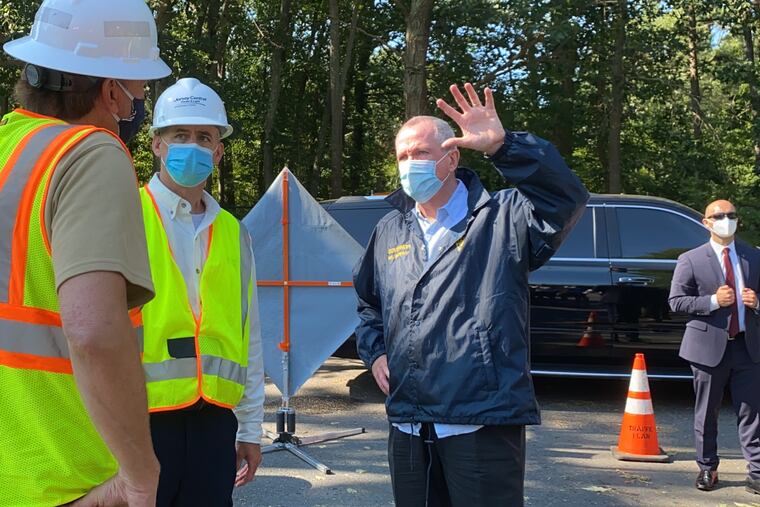N.J. officials beg people to stay away from indoor gatherings; Pa. and Philly coronavirus cases still trending down
SEPTA is touting its subway and elevated train cars as having "excellent" ventilation systems, as it works to lure back riders.

While Pennsylvania and Philadelphia both saw decreases in coronavirus case numbers on Wednesday, the spread of the virus in New Jersey was continuing “too quickly and too widely,” Gov. Phil Murphy said.
The number of cases in New Jersey reported each day and the moving seven-day average number of new cases have fluctuated over the two weeks, more than doubling and then falling slightly since Friday. The transmission rate remains above 1.0, meaning for every person who contracts the coronavirus, at least another person is infected.
“We all need to be in this fight together,” Murphy said. “This is no time for complacency, for selfishness, or for thinking that someone else can wear a face mask but not you. Please do your part.”
Pennsylvania and Philadelphia saw another day of new downward trends.
Pennsylvania reported 705 new coronavirus cases on Wednesday, bringing the seven-day average below 800 for the first time since July 18, according to an Inquirer analysis.
Philadelphia added the same number of new cases — 106 — on Wednesday as on Tuesday, when officials announced cases had begun decreasing in the city.
» READ MORE: ‘Good news’ on coronavirus case totals in Philly, though officials don't know if it will last
As millions across the country worry about taking public transit because of the potential spread of the virus in enclosed spaces, SEPTA said its subway and elevated train cars have “excellent” ventilation systems, with air flowing through filters every two to three minutes.
That’s more often than the New York subway’s circulation rate of 18 times an hour, according to the New York Times, and the even lower air-exchange rates in restaurants or offices.
SEPTA is seeing about a third of its usual ridership, though spokesperson John Golden said it is projected to steadily increase.
“We want riders to know that we’re doing everything we can to stop the spread and that their safety is paramount,” said assistant general manager Kim Scott Heinle.
» READ MORE: Face masks are required on SEPTA. Are riders complying?
As Philadelphia did with a public campaign promoting mask-wearing, New Jersey this week launched a summer ad blitz encouraging people to get tested and to respond to calls from contact tracers, said Health Commissioner Judith Persichilli.
The ads will run in several languages and will be targeted toward at-risk populations like seniors, farmworkers, and frontline workers. The messages will also target people under 30, due to a growing number of cases among younger individuals and reports of crowded house parties that could lead to clusters of infections.
“We must continue to emphasize the message that when young people gather in crowded spaces without the proper precautions, they are putting their loved ones at risk. They may affect their parents, grandparents, aunts, and uncles,” Persichilli said.
Murphy acknowledged that it’s hard to enforce his new ban on gatherings of more than 25 people when a party is held in a private home, but he urged local officials and parents to discourage the behavior. He also said county and local governments were watching for advance notice of parties.
Violating the indoor-gathering limit is a disorderly persons offense carrying a sentence of up to six months in jail and a maximum fine of $1,000. Peter Aseltine, a spokesperson for the state Attorney General’s Office, said that additional charges involving more serious penalties could be filed, depending on the circumstances.
Last week, two lawmakers proposed a bill that would make it a crime for someone to refuse to wear a face mask in stores during the pandemic. Penalties would range up to a $500 fine and 30 days in jail.
Murphy said Wednesday that he agreed with the “spirit” of the legislation but noted that groups like the American Civil Liberties Union of New Jersey have expressed concern about criminalization and indicated that the details of fairly crafting such a policy could be complex.
Edward Lifschitz, the Department of Health’s medical director, said the growing number of cases among young people may be a factor in the state’s low hospitalizations. Though it’s good in the short term to have less serious cases, he said they could eventually lead to higher numbers of serious cases or deaths.
“For the state as a whole it’s very concerning because those younger people can infect other people, they themselves can sometimes become sick, and while we’re not seeing it yet,” he said, “we’re always trying to figure out what we might be seeing two, four, six, eight weeks down the road if this continues.”
Staff writers Hadriana Lowenkron, Rob Tornoe. and Laura McCrystal contributed to this article.